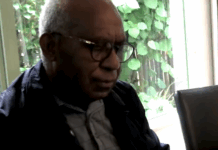Hamilton law student Sarah Thomson speaking about her court case against the NZ government. Video: Greenpeace NZ
A New Zealand law student is battling the country’s government in court today over an alleged “failure” to properly address climate change, reports Greenpeace.
A win could potentially mean the government would be forced to go back to the drawing board and come up with more ambitious climate targets.
Along with similar lawsuits, it will set a bar for the type of action that developed countries must take to prevent dangerous climate change.
Sarah Thomson, 26, claims that as a developed country, New Zealand has an obligation under the Paris Agreement to set a target in line with the scientific consensus.
“So far the New Zealand government has shirked its responsibilities, set unambitious and irrational targets, and justified it all by saying we’re too small to make a difference,” she says.
“Climate change is a global issue affecting us here and now, and we all have a responsibility to act. Every year we’re experiencing more extreme weather events, including cyclones, droughts and floods, which are leaving entire communities devastated.
“I’m young and I’m terrified of a time when I might have to look my kids in the eye and explain to them how we let this happen.”
Inspired by global litigation
Thomson decided to launch the lawsuit after being inspired by global climate change litigation, including the 900 Dutch citizens who filed a case against the Dutch government, and a US case where 21 kids are taking on the Federal government and fossil fuel companies.
The litigation is the first of its kind in New Zealand and will be heard over the course of three days, starting from today, in the Wellington High Court. The outcome of the case is not likely to be known for several months.
Greenpeace New Zealand has helped organise a public mobilisation in support of Thomson, which is taking place this morning on the steps of the court.
The case has the backing of several world-renowned climate change experts, including the “father of climate change awareness”, former NASA researcher, James Hansen, who is a witness for the case.
Intergovernmental Panel on Climate Change (IPCC) author Dr James Renwick will also be giving evidence.
One of the targets under review is New Zealand’s Paris Agreement commitment to reducing greenhouse gas emissions by 11 percent below 1990 levels by 2030. The lawsuit will ask the Minister for Climate Change Issues, currently Paula Bennett, to justify the way in which this target was set.
In her preliminary statement of defence, Bennett has denied that the New Zealand government needs to set a target that strengthens the global response to climate change to hold warming to “well below” 2C, with an aim of 1.5C, as stipulated by the Paris Agreement.
Lawyer Dennis van Berkel, who successfully argued the Dutch climate litigation case in 2015 setting a global precedent, said he would be watching what happens in New Zealand with keen interest.
“The Dutch case proves that all governments have a legal duty to protect their citizens against climate change by doing their part to lower emissions,” he said.
“Given the notoriously inadequate climate policies of New Zealand, this case may lead to the same conclusion. Global climate change litigation is growing, and all eyes are now on this hearing in this very important case.”
New Zealand has the second-highest level of emissions per GDP unit in the OECD and the fifth-highest emissions per capita.
A recent Greenhouse Gas Inventory report confirmed that as of 2015, net emissions have increased by 63.6 percent since 1990.
The New Zealand climate case is one of the many people-powered legal actions taking place around the world related to climate change.
These include actions initiated by frontline communities in the Philippines, senior women in Switzerland, indigenous peoples in Canada, farmers from Peru and Pakistan, youth in Norway, Pakistan, Uganda, and the United States, and individuals and NGOs in Belgium, the Netherlands, and Sweden.
In each of these cases, people are using the power of the law because governments and fossil fuel companies are failing to protect and to respect human rights to a safe, stable climate and healthy environment.










































